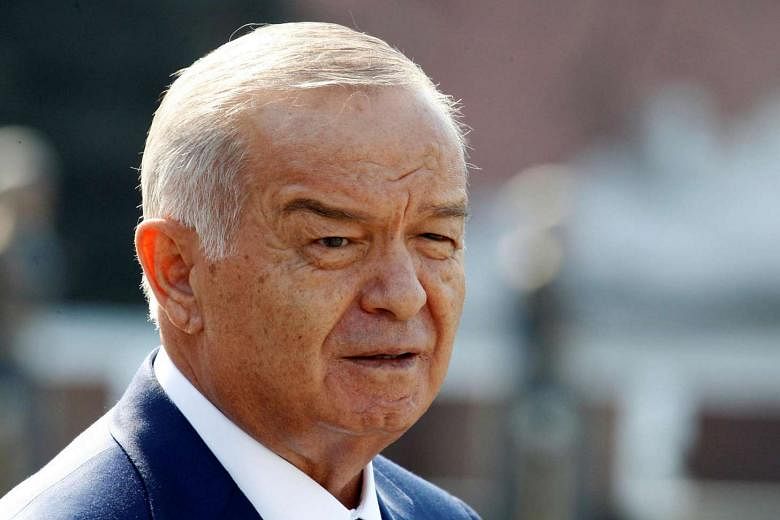MOSCOW (AFP/REUTERS) - Uzbekistan's President Islam Karimov died on Friday (Sept 2), the government announced, ending over a quarter of a century of his iron-fisted rule in the Central Asian nation, with no clear successor in place.
"Dear compatriots, it is with huge grief in our hearts that we announce to you the death of our dear president," a state TV presenter said, reading an official statement.
The authorities said Mr Karimov, 78, was pronounced dead at 8.55pm local time after he suffered a stroke over the weekend and fell into a coma, following days of speculation that the authorities were delaying the announcement of his death.
Mr Karimov's youngest daughter Lola wrote on Facebook "he has left us... I am struggling for words, I can't believe it myself".
The strongman's funeral will be held in his home city of Samarkand, central Uzbekistan, on Saturday morning according to his wishes as the country begins three days of mourning, the statement said.
Uzbekistan now faces the greatest moment of uncertainty in its post-Soviet history.
Mr Karimov's body was to be flown to Samarkand airport, which on Saturday will be closed to all flights except those with special permission.
From there, the funeral cortege is to set off at 6am local time, with people able to pay their last respects from 9am on a city square close to the cemetery where he will be buried, Russian news agencies reported, citing local officials.
Loyalist Prime Minister Shavkat Mirziyoyev is heading the organisation committee for the funeral, suggesting that he could be in line to take over long-term from Mr Karimov.
Under Uzbek law, senate head Nigmatulla Yuldashev should now become acting president until early elections are held.
Uzbek state television switched to footage of folk musicians playing traditional instruments against a black background after announcing his death.
United States President Barack Obama issued a statement affirming his support for the people of Uzbekistan.
"As Uzbekistan begins a new chapter in its history, the United States remains committed to partnership with Uzbekistan, to its sovereignty, security, and to a future based on the rights of all its citizens," he said.
Chinese President Xi Jinping said on Saturday that China had lost a "true friend" with the death of Mr Karimov, in a message of condolence to a country Beijing considers an important partner in its war on terror.
Mr Xi, in a message sent to acting President Nigmatilla Yuldoshev and carried by China's Foreign Ministry, said Mr Karimov had made "historic contributions" to the country's development and prosperity.
"President Karimov dedicated himself over a long period to friendly Sino-Uzbek cooperation and put painstaking efforts into developing an all-round, strategic partnership and increasing the traditional friendship between the two peoples," Mr Xi said. "Karimov's unfortunate passing is not only a huge loss to the Uzbek people, but also means the Chinese people have lost a true friend," he added.
China wants to continue working hard to consolidate and deepen the two countries' cooperation and friendly relations, Mr Xi said in the brief message.
Mr Xi visited Uzbekistan in June, where state media said both nations agreed to deepen their counter-terrorism cooperation, and ensure the safety of pipelines into China from Central Asia which are vital for Chinese energy security.
Russian President Vladimir Putin called Mr Karimov's death "a great loss for the people of Uzbekistan" in a telegram to interim leader Yuldashev, while Prime Minister Dmitry Medvedev is set to jet in for the funeral.
Tajik President Emomali Rakhmon confirmed he will attend while Turkmen President Gurbanguly Berdymukhamedov was reported to also be planning to go.
Ex-Soviet Kyrgyzstan, Belarus and Kazakhstan all said they were sending delegations headed by their prime ministers.
Former Soviet leader Mikhail Gorbachev, who appointed Mr Karimov to head the former Socialist Republic of Uzbekistan in 1989, told Interfax news agency that Mr Karimov was "a competent man with a strong character".
Kazakhstan's strongman leader Nursultan Nazarbayev, who has ruled for as long as Mr Karimov, said: "I grieve for the loss of a friend whom I worked with side-by-side for 30 years."
Long condemned by rights groups as one of the region's most brutal despots who ruthlessly stamped out opposition, Mr Karimov was one of a handful of Soviet strongmen who clung to power after their homelands gained independence from Moscow in 1991.
Mr Karimov portrayed himself as guarantor of stability and bulwark against radical Islam on the borders of Afghanistan, crushing fundamentalist groups at home.
Born on Jan 30, 1938, Mr Karimov was raised in an orphanage in the ancient city of Samarkand, before studying mechanical engineering and economics and rising up the ranks of the Communist party.
Rights groups - which have long accused Mr Karimov's regime of the most serious abuses including torture and forced labour in the lucrative cotton industry - said his time in power had been a catastrophe for Uzbekistan.
"Islam Karimov leaves a legacy of a quarter century of ruthless repression," Steve Swerdlow, Central Asia researcher at Human Rights Watch, said.
"Karimov ruled through fear to erect a system synonymous with the worst human rights abuses: torture, disappearances, forced labour, and the systematic crushing of dissent."
Most seriously, the authorities were accused of killing hundreds of protesters in the eastern city of Andijan in 2005.
In the wake of international criticism over the alleged massacre, which Karimov's regime rebuffed, Tashkent shut down a US military base used to supply operations in neighbouring Afghanistan since 2001.
The head of the Russian Lower House of Parliament's international affairs committee, Mr Alexei Pushkov, said Mr Karimov's death ushered in a "phase of uncertainty over Uzbekistan's future".
Despite economic growth of some eight percent, critics say that Uzbekistan's economy is in a dire situation with a corrupt elite in control of most of its industry.

